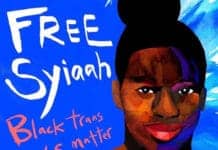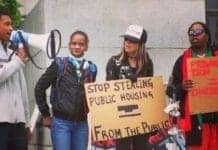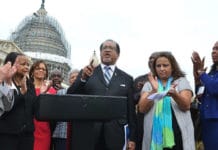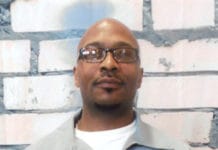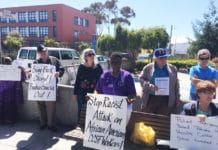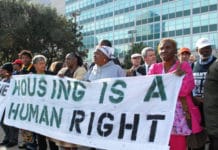by Lynda Carson

Oakland – In these harsh times of conflicting state and federal laws regarding medical marijuana, which is currently legal in many states but still illegal under federal law, across the nation public housing and Section 8 tenants are facing discrimination, eviction and homelessness for medical marijuana use.
According to a Feb. 10, 2011, memorandum from the Department of Housing and Urban Development (HUD), Public Housing Authorities (PHAs) can terminate housing assistance or deny housing to individuals for use of a controlled substance, including medical marijuana. Tenants applying for housing may be denied housing assistance by a PHA or nonprofit housing developer if they admit to using medical marijuana.
An additional 2014 HUD memorandum states that owners of federally assisted housing are required to deny admission to any household with a member who the owner determines is, at the time of application for admission, illegally using a controlled substance. In summary, owners must deny admission to assisted housing for any household with a member determined to be illegally using a controlled substance, e.g., marijuana.
However, Section 577 of the Quality Housing and Work Responsibility Act of 1998 (QHWRA) affords owners the discretion to evict or not evict current tenants for their use of marijuana.
HUD’s one-strike policy, initiated by President Bill Clinton in his 1996 State of the Union Address, “(T)he rule for residents who commit drug crimes and peddle drugs should be one strike and you’re out,” has threatened many senior citizens with eviction and homelessness for alleged crimes committed by others, including four senior citizens in Oakland, California.
The four evictees were all elderly citizens who had not been charged with any criminal activities before the eviction proceedings took place. They were defended in court and all the way to the U.S. Supreme Court by Anne Omura and the Eviction Defense Center. All four were African-Americans. They had resided in public housing for many years, and three of them were elderly women caring for extended families with children and grandchildren.
Presently, HUD also prohibits cigarette smoking in public housing units across the nation as of July 2018.
Medical marijuana users face eviction or loss of housing assistance
It was just last week that 78-year-old John Flickner, a medical cannabis user, was evicted from his Niagara Falls apartment. After receiving bad press across the nation for evicting the poor old guy, the landlord reportedly reversed course and allowed Flickner to move back into his apartment last Monday. But by then the damage was already done, and reportedly the program that coordinates his health care has dropped him, leaving the 78-year-old man without access to doctors and transportation.
In another case, reportedly last July 2018, Emma Nation was evicted from her federally subsidized apartment by a nonprofit housing developer in Arcata, California, after a maintenance worker was snooping around her apartment and spotted Nation’s medicinal cannabis edibles that she used for medical purposes.
In a blatant case of legal housing discrimination, 55-year-old Lily Fisher of Billings, Montana,was shocked when she was advised that she cannot receive housing assistance after admitting that she had a state-issued medical marijuana card. According to the Billings Gazette, “The Billings woman was diagnosed with breast cancer in 2005. During the treatment, she developed blood clots in her foot, which led to the amputation of the lower part of her leg.
“To cope with the pain, her physician prescribed two types of narcotics, hydromorphone and oxycodone. The potentially addictive drugs left Fisher in a constant fog, and she quit them cold turkey before looking to medical marijuana to deal with the pain.”
In Pennsylvania, reportedly 66-year-old Mary Cease, a public housing tenant, was denied a Section 8 housing voucher by the Indiana County Housing Authority because she successfully applied for a medical marijuana card and qualified because of pain from multiple back surgeries in addition to a diagnosis of post-traumatic stress.
During April of 2017, reportedly Stonebridge apartments in Washington, D.C., posted some bright orange signs warning tenants that any use of marijuana may result in evictions because it would be considered a violation of their lease.
Trump official wants to ‘legally permit’ medical marijuana in federally-subsidized housing
According to a website promoting “sensible” regulation of marijuana, “Lynne Patton, a U.S. Department of Housing and Urban Development (HUD) regional official who oversees New York and New Jersey, responded on Twitter to a story about John Flickner, a 78-year-old man who was recently evicted from his Niagara Falls, New York, apartment over his use of medical cannabis to treat chronic pain.”
“State and federal law needs to catch up with medicinal marijuana usage and require private landlords to legally permit the same. Period,” Patton wrote. “Regardless, my team is already working with Mr. Flickner and a local grantee to place him in permanent housing again, as anyone else in his boat.”
The crazy federal marijuana laws need to be overturned and eliminated because of the harm being done to seniors and others who may or may not be residing in subsidized housing.
Lynda Carson may be reached at tenantsrule@yahoo.com.

 Store
Store




